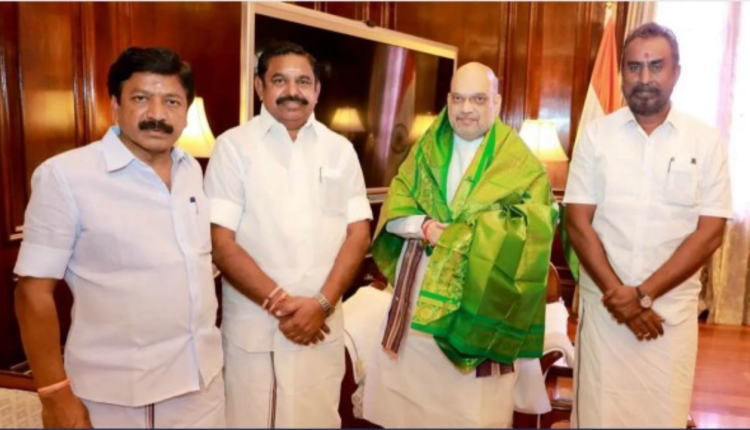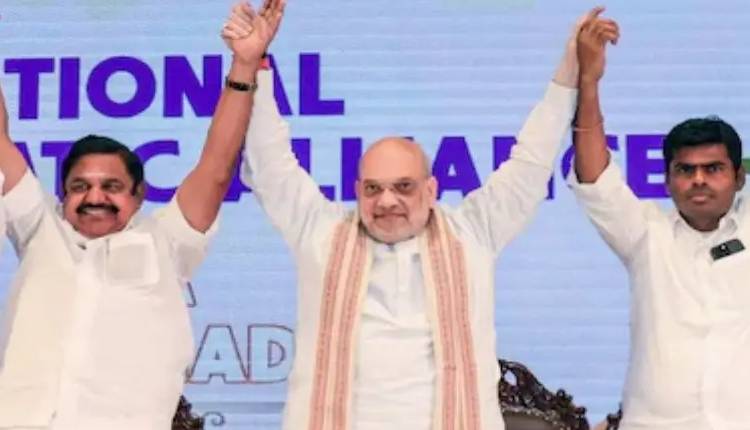Chennai: A newly formed alliance between All India Anna Dravida Munnetra Kazhagam (AIADMK) and Bharatiya Janata Party (BJP) for the 2026 Tamil Nadu Assembly elections has encountered early friction after AIADMK General Secretary Edappadi K. Palaniswami’s statement contradicting earlier remarks by Union Home Minister Amit Shah has caused further uncertainty surrounding their partnership and what that might entail for Tamil Nadu’s political landscape.
As Partnership Initiatives Get Under Way in Favour of Partnership
On April 11, 2025, AIADMK and BJP formally declared their reunion as members of the National Democratic Alliance (NDA), ending two years of division since disagreements with then BJP Tamil Nadu Chief K. Annamalai first came up two years prior. At a joint press conference held by both sides in Chennai that same day, Shah announced that this coalition led nationally by Prime Minister Narendra Modi and regionally by Palaniswami would form a government together, hinting at collaborative arrangements; Palaniswami also concurred, calling it a historic moment which could accelerate Tamil Nadu’s progress while offering thanks for his support towards both parties’ respective roles within Tamil Nadu’s progress and thanking Modi for his help and his support towards Tamil Nadu’s progress and growth.
Palaniswami quickly issued clarification of Shah’s remarks as not signalling coalition governments in Tamil Nadu. Speaking with reporters outside of the Tamil Nadu Assembly, he pointed out, “Shah did not say there would be a coalition government; the media has misunderstood this issue…The alliance will win and I will form my government; however, it does not entail power sharing.” Additionally, he stressed how AIADMK historically opposed coalition governments within their state borders.
Response from BJP: Damage Control
Palaniswami’s statements aroused speculation of division within their alliance, leading them to downplay any controversy caused by Palaniswami’s comments. Tamil Nadu BJP President Nainar Nagenthran noted that Modi and Palaniswami would jointly decide governance matters together and the leadership structure was clear from day one; sources with access to them told media outlets Palaniswami was being misconstrued, affirming his involvement and that no government role had been excluded for them by Palaniswami or by anyone. “EPS is emphasising the AIADMK lead as agreed during alliance formation,” clarified a senior BJP leader while dispelling suggestions of AIADMK resistance or lack thereof.
Why Take an Anti-Power Sharing Approach?
Palaniswami’s insistence on ruling out coalition governments accords with Tamil Nadu’s political tradition, in which both AIADMK and Dravida Munnetra Kazhagam (DMK) have historically held power without sharing it among coalition allies – unlike in many states with more widespread coalition governments; Dravidian giants tend to retain single control even when aligned electorally – giving Palaniswami time to assuage AIADMK’s base, who may still harbour concerns regarding Annamalai’s controversial remarks regarding C.N. Annadurai and J. Jayalalithaa’s respective icons, C.N. Annadurai and Jayalalithaa.
Palaniswami’s careful approach may also stem from his electoral strategy: Palaniswami has consistently stressed defeating “anti-people” DMK as their top objective, something reiterated during April 16 comments by saying that we were seeking “all parties united against DMK… the BJP joined our ranks first”. By not sharing power among alliance partners, he hopes not to divide the anti-DMK vote while still maintaining AIADMK leadership status amid weak performances such as its failure in the 2024 Lok Sabha elections (where the AIADMK did not win any seats).
Alliance Dynamics and Challenges
The AIADMK-BJP alliance represents an effective means to consolidate anti-DMK votes in Tamil Nadu, where the DMK’s INDIA bloc, made up of Congress and Left parties, dominated recent elections by winning 22 Lok Sabha seats out of 40 in 2024. AIADMK’s vote share increased marginally to 20.5% from 19.3% between 2019 and 2024 due to the coalition. AIADMK views a united front as key against Chief Minister M.K. Stalin’s government; yet the alliance faces several difficulties due to personality clashes within both groups as well as obstacles within each alliance.
Historical Tensions: Annamalai’s aggressive style and perceived disregard of AIADMK history led to their 2023 split, but even after she stepped down as state chief before their alliance was revived, any residual feelings among AIADMK cadre could hinder grassroots coordination efforts.
Ideological Discord: The BJP’s national agenda, such as Hindi imposition and central policies, often conflicts with Tamil Nadu’s Dravidian sensibilities – making the alliance harder to sell to AIADMK voters.
Emergent Players: Actor Vijay’s Tamizhaga Vetri Kazhagam (TVK), as well as smaller parties under its banner, could divide anti-DMK support. There has been speculation of AIADMK-TVK-BJP coordination; however, Vijay’s independent approach and recent boycott suggest difficulty forging such an alliance.
Internal Pressures: Palaniswami’s remarks could also reflect internal AIADMK dynamics, with D. Jayakumar previously dismissing any alliance reports with BJP to maintain party unity and balance cadre sentiment with electoral strategy in an endeavour for victory in elections.
DMK Narrative
The DMK has taken note of apparent discord among alliance members, using MP Kanimozhi as an example to denounce it as being exploitative and exploitive of national leadership’s weakness by appeasing both parties – such as by remaining soft towards them in order to appease national leadership – against whom Palaniswami had pledged allegiance. On April 11 Kanimozhi pointedly noted he “swore never to align himself with them after they insulted AIADMK’s leaders while now they share the same stage.” DMK chief M.K. Stalin called this alliance an act, questioning Palaniswami’s credibility while alleging AIADMK remains soft towards it to appease national leadership; in doing it this way, his narrative seeks to portray it as unstable while banking on its own coalition to hold power after the 2026 elections.
What Lies Ahead?
The newly formed alliance between AIADMK and BJP, formalised over the past few days, has already come under close examination. Palaniswami’s “no power-sharing” position indicates that AIADMK intends to lead both its campaigning activities and any possible government formation, potentially diminishing any influence BJP might otherwise wield over Tamil Nadu governance. If they want to expand their footprint – their 2024 vote share was 18.28% as opposed to 18.80% seen four years earlier – then carefully manage these terms so as not to alienate workers or risk losing them over time.
Analysts contend that the success of Amit Shah and company hinges on seat-sharing negotiations and inclusion of other parties like Pattali Makkal Katchi (PMK). Posts on X indicate ongoing discussions to strengthen the coalition, such as one user noting, “Amit Shah urges unity to defeat DMK, with PMK currently discussing joining.” Nevertheless, as the 2026 election approaches, further testing will come for this alliance’s ability to present one united front.
Palaniswami’s remarks have established a firm boundary, signalling that while AIADMK remains open to electoral partnerships with others in Tamil Nadu’s political scene, their influence remains firm over Tamil Nadu as an entire entity. How this impacts alliance strength or weakening will depend on how the BJP responds and reacts within Tamil Nadu’s highly competitive political arena.



Comments are closed.